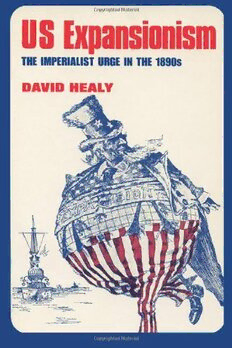
US Expansionism: The Imperialist Urge in the 1890s PDF
Preview US Expansionism: The Imperialist Urge in the 1890s
US EXPANSIONISM US Expansionism The Imperialist Urge in the 1890s DAVID HEALY THE UNIVERSITY OF WISCONSIN PRESS The University of Wisconsin Press 1930 Monroe Street, 3rd floor Madison, Wisconsin 53711-2059 uwpress.wisc.edu 3 Henrietta Street London WC2E 8LU, England eurospanbookstore.com Copyright © 1970 The Board of Regents of the University of Wisconsin System All rights reserved No part of this publication may be reproduced, stored in a retrieval system, or transmitted, in any format or by any means, digital, electronic, mechanical, photocopying, recording, or otherwise, or conveyed via the Internet or a Web site without written permission of the University of Wisconsin Press, except in the case of brief quotations embedded in critical articles and reviews. Printed in the United States of America LC 71-121769 ISBN-13: 978-0-299-05854-8 (pbk: alk. paper) TO ANN ERICKSON HEALY this book is fondly and gratefully dedicated. Table of Contents Acknowledgments ix Introduction 3 PART I: THE SETTING 1 A World of Empires 9 2 Destiny and Dollars 34 3 Evolution of the New Imperialism: The Philippines 48 4 James Harrison Wilson: A Transitional Expansionist 68 PART II: THE MATRICES 5 The Tone of Society 99 6 Theodore Roosevelt and the Sturdy Virtues 110 7 Civilization, Barbarism, and Christianity 127 8 Elihu Root: A World of Order and Progress 144 9 Commercial Domination 159 10 Charles Denby: The China Market 178 11 Charles A. Conant: The Implications of Commercial Struggle 194 PART m: THE ISSUES 12 The Anti-Imperialist Movement 213 13 Conflict and Consensus 232 Conclusion 248 Notes 259 Bibliography 291 Index 309 vii Acknowledgments LIKE MOST scholars, the author of this work owes a great deal to his colleagues. When the project was merely an idea, I found my thinking stimulated by fortunate contact with Professors Raymond Betts, of Grinnell College, and Pierre Boulle, now of McGill Uni versity. Here at the University of Wisconsin-Milwaukee I have benefited by the counsel and criticism of an embarrassing number of my fellows. Of those who gave so ungrudgingly of their time and knowledge, I must mention by name Professors A. Theodore Brown, Keith Bryant, Bruce Fetter, Lillian Miller, Roland Strom berg, and Walter Trattner. To these should be added Professor Eugene Trani of Southern Illinois University, and Miss Martha Beier, who made the index. The faults of the book are mine alone. As usual, the greatest contribution of all came from my wife, to whom this book is dedicated. ix
